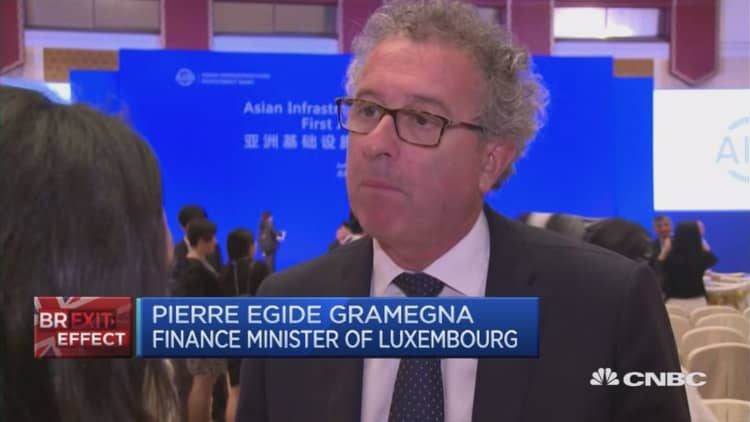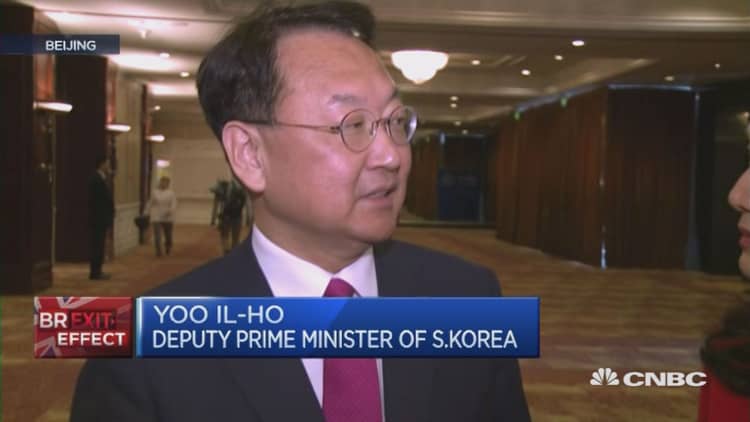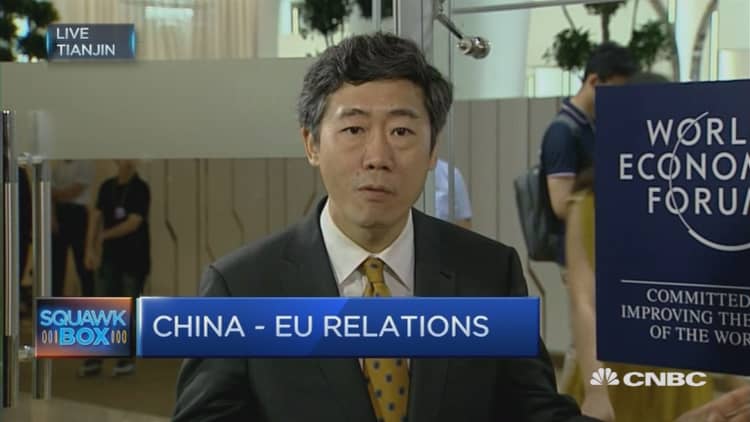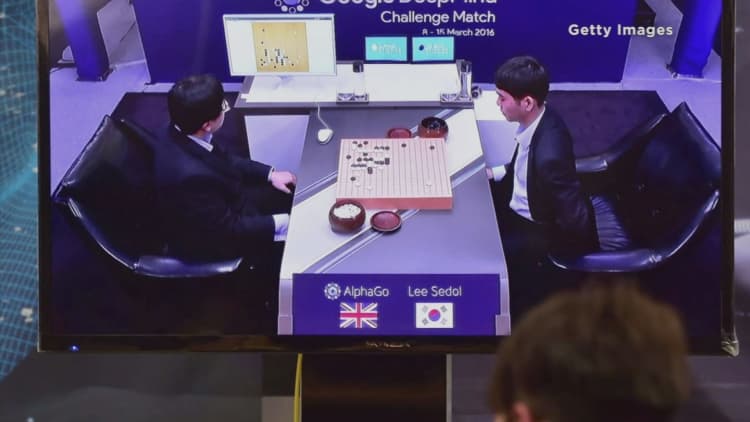Tuesday, June 28: China's Eden-style ambitions
Relatively clear skies marked the first two days of Summer Davos, but the last day brought a familiar sight to Tianjin: a visible layer of haze.
China's longstanding battle with pollution has become central to discussion about its economic development, and featured prominently at Tuesday's start to the conference.
Experts acknowledged the government's commitment to battling poor air quality, reflected by prevention and control plans for industrial sectors in key regions, but warned that the path to progress was long.
It could be another 10-15 years before blue skies became the norm, Changhua Wu, China director at TIR Consulting, said at a WEF briefing on the issue.
Many recognized the declines in coal consumption—the leading driver behind the country's notorious smog—but pointed to geographical discrepancies that hindered nationwide implementation of hydro, solar or wind power.
Unlike the western and central regions of the country, the east lacked resources for clean energy, underlining the need for an integrated network, pointed out Wang Yimin, secretary-general of the Global Energy Interconnection Development and Cooperation Organization (GEIDCO).

That's part of the reason the government was ramping up efforts to increase the supply of solar panels.
By 2030, China's solar panel capacity will be 400 gigawatts (GW), versus 35 in 2015, Gao Jifan, CEO of Trina Solar, one of the world's biggest solar panel makers, noted on Monday.
Offering a more creative take on China's pollution struggle at the conference was Guoyuan Deng, an artist who's long dealt with the nature themes in his work.
His installation consisted of an Eden-style garden surrounded by mirrors, meant to "convey hope in the wake of rapid technological change."
And as China embraces new technologies to achieve a greener future, its citizens would surely find resonance in Guoyuan's work.
Monday, June 27: WEF says hello to Jia Jia
China is the world's largest market for industrial robots so it's no surprise that the man-made machines are one of the major highlights at this year's Tianjin event.
On the second floor of the massive convention center hosting this year's World Economic Forum (WEF) conference, participants came face-to-face with a well-groomed, white-robed Chinese lady by the name of Jia Jia.
When addressed in Mandarin, Jia Jia is able to converse, seen by lip movements, and show "micro" facial expressions. She can also decipher your age and gender, earning her the nickname "Robot Goddess," a nod to her good looks and apparent intelligence.
Created in 2014 by scientists at the University of Science and Technology of China (UST), she's the third-generation of humanoid robots produced by the university.
Jia Jia is connected to the university's cloud computing platform so her ability to process human emotions and interact are enhanced every time the team uploads fresh data, explained a UST spokesperson.
Aside from being a WEF attraction, Jia Jia has previously been a museum guide, a shopping mall salesperson and a talk show host.
Sales of industrial robots rose 17 percent in China last year, according to the International Federation of Robotics, but that was significantly lower than 2014's 56 percent increase. Despite the slowdown, the nation still accounted for more than a quarter of the 248,000 industrial robots sold globally.
"We hope Jia Jia will become part of the world soon," said the UST spokesperson. "In the future, once we create more robots, she will be able to share knowledge with others, creating a robot social network. Eventually, these robots will be able to talk to each other."
Also on display at WEF was the 'Socially Aware Robot Assistant,' or SARA, developed by Carnegie Mellon University.
SARA is designed to collaborate with human users and personalize the human-machine interaction experience through an analysis of the user's social behavior thanks to a unique version of socially-aware artificial intelligence.
At WEF, SARA acted as a personal assistant for conference attendees but she's also used for educational purposes. She interacts with autistic children as a way for them to acquire and practice social skills while also acting as a resource for students in under-developed schools.
This April, Beijing announced it intended to triple industrial robot production to 100,000 per year by 2020, from fewer than 33,000 in 2015, citing booming demand in health care, scientific research and domestic service sectors.
Sunday, June 26: All Brexit, all the time



A year ago, the World Economic Forum (WEF) likely had no idea just how significant its 2016 Annual Meeting of the New Champions conference would be.
The three-day event, which kicked off Sunday in Tianjin, China, was the first gathering of high-profile commentators to occur in the immediate aftermath of the U.K.'s historic Brexit referendum, providing a flood of commentary for market participants to digest.
Unsurprisingly, the consequences of the U.K's decision dominated the bulk of discussions on Sunday.
Early in the day, Nobel Prize winning economist Nouriel Roubini warned that Brexit could mark the beginning of the EU's disintegration, proving once again that his nickname "Dr Doom" was well earned.
Speaking at a CNBC panel, CloudFlare CEO Matthew Prince warned that talent recruitment across Europe could become legally challenging for his London-based business, adding that some of his non-U.K. team members that held EU citizenship felt unwelcome in the British capital.
But not everything was Brexit mania.
Jeremy Lin on Steph Curry
A session with National Basketball Association (NBA) star Jeremy Lin injected a lighter tone, with the 27-year old discussing the extent of fame, or "Linsanity" in his case, and career prospects.
Born to Taiwanese parents in California and educated at Harvard University, Lin was one of the NBA's first Asian-American players, causing a frenzy in the sports world when he shot to fame in 2011 and 2012 during his time with the New York Knicks, and becoming an icon to Asians across the globe.
"I want to see more Asian players in the NBA," he said on Sunday.
Lin is currently a free agent after playing for the Charlotte Hornets, a team owned by Michael Jordan. "I've played six years in the NBA with five different teams. I'm tired of moving. Now, I want to see how good I can become."
While Lin couldn't mention any teams he's interested in playing for as a free agent, he said he intended to exhaust every opportunity.
"I've always been open to going back to New York. Right now, I'm not sure if its the best timing right now but if it happens, it happens," he told a gathering at the Tianjin meeting.
Lin, who's taken a backseat to media attention in recent years, was also full of praise for the sport's current darling, Stephen Curry of the Golden State Warriors.
"Steph smiles and jokes but when he steps on the curt, he's going for blood. But the way he carries himself is a humble demeanour."

'AlphaGo does not waver'
A talk with Lee Sedol, a grand-master of the ancient strategy game Go, was another non-Brexit highlight of Sunday.
Considered one of the greatest players of all time, Sedol was famously defeated by Google's artificial intelligence (AI) system AlphaGo in March, marking a milestone in the development of AI.
Also known as Baduk, Go is widely known as the world's oldest board game and considered more difficult than chess due to the higher number of possible moves from a player's position.
Sedol, 33, said he was surprised by the defeat, noting that Go required intuition and other capabilities he didn't think a computer algorithm was capable of.
"Humans have a lot of psychological movements. We may have the precise answer but sometimes, we waver in our approach," Sedol told a session called Human vs Machine. "AlphaGo did not waver."

